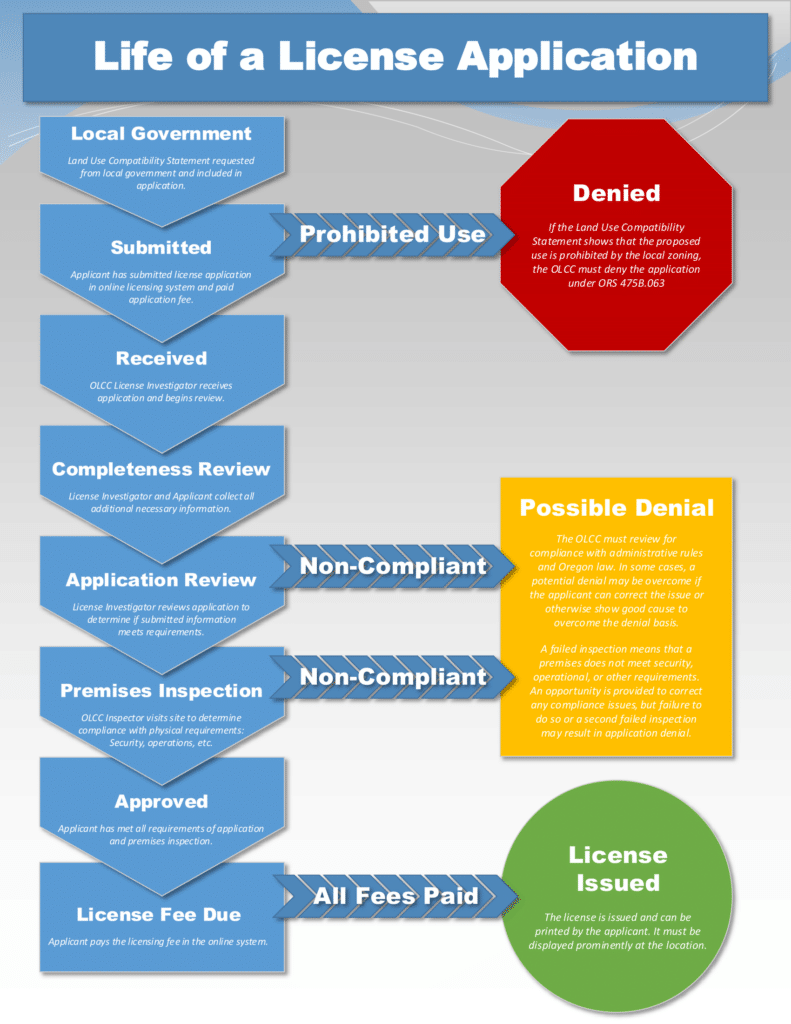How to Open a Dispensary in Oregon
Oregon’s progressive marijuana laws have paved the way for a flourishing cannabis market, but opening a dispensary still requires careful planning and adherence to regulations.
You’ll need to obtain the necessary licenses and permits, secure a suitable location, develop a solid business plan, and navigate the complex web of compliance requirements to get started.
Let’s dive into the essential steps to help you embark on the exciting journey of legalized cannabis in Oregon.

Overview of Cannabis in Oregon
Oregon has established itself as a trailblazer in the cannabis industry, legalizing medical marijuana in 1998 and recreational use in 2014.
The state boasts a robust market with numerous dispensaries and a diverse range of products. Regulations are in place to ensure quality, safety, and compliance, making it an attractive destination for entrepreneurs looking to enter the cannabis business.
Why Start a Cannabis Business?
Opening a dispensary offers immense opportunities:
-
High Demand
With the growing acceptance of medical and recreational cannabis across multiple states and countries, dispensaries are seeing a surge in demand. Consumers are increasingly looking for high-quality products for health, wellness, and leisure, creating a constant need for reliable, accessible dispensaries.
-
Job Creation
The cannabis industry is projected to create thousands of jobs across various sectors, including cultivation, retail, logistics, and marketing. This growth not only provides employment opportunities but also contributes to local and national economies.
-
Strong ROI Potential
Entrepreneurs who navigate the complex regulatory landscape can make big returns on their investments. With proper business planning, branding, and compliance, dispensaries can tap into a rapidly growing market with high-profit margins.
Types of Dispensary Licenses in Oregon
Application Process for a Dispensary License
Obtaining a dispensary license in Oregon requires navigating a detailed online application process. To ensure a successful application, prospective dispensary owners must carefully follow the required steps and meet all necessary criteria.
Steps Involved in Obtaining a License

Note: Specific requirements and processes may vary, and it is essential to consult the latest guidelines and information provided by the OLCC and other relevant government bodies throughout the application process.
Required Documentation for a License
The application process is available online via CAMP – OLCC’s New Online Licensing System. The Cannabis and Alcohol Management Program (CAMP) is developed by the OLCC and designed to streamline the processes for marijuana and liquor licensing and permits. Applications for all types of cannabis business licenses are done through this program. However, the documentation varies per license type.
General requirements
During the application process, the applicant must present the following items:
- Business details
- Company name
- Physical and mailing address
- Secretary of State Number
- Funding resources (interested parties and legal entities)
- Land Use Compatibility Statement (LUCS)
- Business Operating Plan
- Floor plan of the proposed facility
- Proof of right to occupy the premises
- Other documentation depending on the license type
Retail
- Retailer Home Delivery Guide
- Acceptable ID for Marijuana
- If You Were Born After (Legal Age for Purchase) Sign
- Retail Sales Limits
- Oregon Driver Licenses & ID Cards
Please refer to the OLCC website for the full list of forms, reports, and publications required during the license application process depending on the license type.
Timelines for Obtaining a License
The timeline for obtaining a dispensary license in Oregon can vary based on various factors, including the complexity of your application, regulatory requirements, and the efficiency of the licensing process.
Generally, it can take several months to complete the application, undergo background checks, address any deficiencies, and receive final approval.
It is advisable to start the application process well and allow ample time to gather necessary documentation, meet compliance requirements, and navigate the evaluation and approval process.
Financing and Business Plan for a Dispensary
The crucial step in getting a cannabis dispensary license is to develop a business plan, which will be used to secure the necessary financial resources. A solid business plan is one of the most essential tools in an entrepreneur’s toolkit. In general, your cannabis business plan should include the following:
- The physical location of your dispensary
- Funding plan, or the source of your startup and ongoing capital
- Sourcing plan for procuring cannabis products
- Revenue projections
- Estimate or actual number of employees
- Diversity and equity plans
- Marketing plan
- Safety and security plan
- Technology plan
- The insurance company you will be opting for
- Other relevant information you want to document
A well-crafted business plan is essential for the success of your business. It contains all the necessary information to present to potential investors and lenders, outlining the steps you will take to start and expand your business. Agencies like the Small Business Administration (SBA) can help you find funding sources from private companies or banks if you need help getting it.
Overall, while developing your business plan, ensure that you follow Oregon dispensary laws and do not include anything that goes against the rules and regulations.

Types of Financing Available
Securing the right financing is a crucial step in opening a dispensary, and aspiring owners in Oregon have several options to consider.
- Personal Savings: Utilizing personal savings or investments to fund the business.
- Traditional Loans: Securing loans from banks or credit unions based on creditworthiness and collateral.
- Private Investors: Attracting investors who provide capital in exchange for equity or profit-sharing.
- Crowdfunding: Raising funds through online platforms where individuals contribute smaller amounts.
- Cannabis-Specific Lenders: Working with specialized lenders that understand the unique needs of the industry.
- State and Local Grants: Exploring grants or funding programs specifically designed for cannabis businesses.
Risk Management Plan
A risk management plan is crucial for a dispensary to identify and mitigate potential risks and uncertainties. It assesses regulatory compliance, security vulnerabilities, market competition, and operational risks. It also outlines strategies to minimize these risks, such as contingency plans, insurance coverage, robust security measures, and compliance protocols.
A well-developed risk management plan enhances business resilience and safeguards against potential setbacks or liabilities. Here are some key elements that should be included in a risk management plan for opening a dispensary in Oregon:
| Risk Category | Description |
| Compliance Risks | The risk of failing to comply with state and local regulations regarding the dispensary operation. |
| Security Risks | The risk of criminal activity such as robbery, theft, and other security threats. |
| Operational Risks | The risk of equipment failure, supply chain disruptions, and employee turnover can impact the dispensary’s operation. |
| Health and Safety Risks | The risk of health and safety hazards associated with cannabis products if not properly managed. |
| Financial Risks | The vulnerability of the cash-based system to theft and fraud, as well as other financial risks. |
| Reputation Risks | The risk of negative publicity damaging the dispensary’s image and bottom line. |
Location Requirements for a Dispensary
Selecting the right location is crucial for a dispensary’s success. Consider factors such as local zoning regulations, proximity to residential areas, accessibility, parking availability, and visibility. Assess the competitive landscape, potential customer base, and retail compatibility to maximize foot traffic and sales potential.
Medical dispensaries
Your proposed location must be 1,000 feet away from schools or other registered dispensaries. The Oregon School Locator Map can help determine if your proposed location meets the requirements.
Other license types
Different zoning restrictions may apply depending on the license type. However, NO OLCC marijuana license facility may be…
- On federal property
- At the same location as a liquor licensee
- At the same location as a medical marijuana processing site
- At the same location as a medical marijuana dispensary
- In an area that is zoned exclusively for residential use
Insurance Requirements for a Dispensary
Opening a dispensary involves inherent risks, such as theft, property damage, product liability, and employee injury. Insurance policies are necessary to protect your dispensary against these risks and ensure your business can recover financially from unexpected events, legal claims, or operational disruptions.
Types of Policies Required
- General Liability Insurance
- Product Liability Insurance
- Property Insurance
- Commercial Auto Insurance
- Workers’ Compensation Insurance
- Cyber Liability Insurance
Coverage Limits
Coverage limits may vary depending on factors like the dispensary’s size, revenue, and specific needs. It’s essential to assess potential risks and consult with insurance providers to determine appropriate coverage limits that comply with state requirements and provide adequate protection for your dispensary.
Costs Associated with Insurance
The cost of business insurance for dispensaries is subject to variation based on several factors, such as:
- Minimum insurance requirements per state
- Size and scale of your business
- Types of policies required
- Coverage limits
- Number of cannabis licenses held
- Experience in the industry
- Past insurance claims made
Obtaining quotes from multiple insurance providers is recommended, considering their expertise in the cannabis industry. Some state-specific programs may offer insurance resources and guidance, such as the OLCC.

Costs of Opening and Running a Dispensary
Opening a dispensary in Oregon can cost between $350,000 and $2 million. Expenses include property lease or purchase, renovations or build-out, security system installation, inventory, equipment, marketing, staffing, and professional services such as legal and accounting. The actual costs will depend on factors like location, size, and level of desired sophistication. Here are some estimated costs to keep in mind:
| Cost Category | Cost Range |
| License and Permit | $4,000 for medical dispensaries, $1,000 to $4,750 for other types of licenses |
| Rent | $150,000 to $200,000 per year in cities like Hillsboro and Portland |
| Inventory and Initial Product Purchase | The amount varies greatly based on the product selection. The average cost of cannabis flowers is $630/pound. |
| Security Measures | $35,000 to $40,000 |
| Staffing Costs | $25/hr |
Ongoing Costs
Ongoing costs for running a dispensary typically include rent or mortgage payments, utilities (estimated at $2,000 to $5,000 per month), inventory replenishment, employee wages (averaging $30,000 to $60,000 per year per employee), marketing and advertising expenses (varies widely), insurance premiums, security system maintenance, compliance and licensing fees, and taxes.
Taxes and Fees
Dispensaries are subject to various taxes and fees, such as sales taxes, excise taxes on cannabis products, and additional fees imposed by the state or local jurisdictions. The tax rate on retail sales of cannabis products in Oregon is currently 17%, and additional local taxes may apply.
Resources for Potential Entrepreneurs
For potential entrepreneurs looking to enter the cannabis industry in Oregon, several resources are available to provide guidance and support. These resources offer valuable information, educational materials, networking opportunities, and regulatory assistance to navigate the complex landscape of starting a cannabis business in the state.
Additional Resources and Links
FAQ about Opening a Dispensary
What Are the Qualifications for a Dispensary License?
To qualify for a retail dispensary license in Oregon, applicants must meet several requirements. These include being at least 21 years old, passing a background check, demonstrating Oregon residency, having a valid Oregon Marijuana Worker Permit, and providing documentation of a suitable location that meets zoning and distance requirements.
How Much Does It Cost to Open and Run a Dispensary?
The cost of opening and running a dispensary can vary depending on various factors such as location, size, regulatory requirements, and business objectives. On average, the costs of opening a dispensary in Oregon can range from $350,000 to $2 million. Ongoing costs include rent, utilities, inventory, employee wages, marketing expenses, insurance premiums, compliance fees, and taxes.
What Are the Location Requirements for a Dispensary?
The location requirements for a dispensary in Oregon include complying with distance restrictions. Dispensaries must be located 1000 feet from sensitive areas such as schools, parks, and other cannabis businesses. When selecting a location for your dispensary, it’s important to review and adhere to the specific distance requirements set by your local jurisdiction.
What Types of Insurance Policies Are Required for a Dispensary?
Types of insurance policies required for a dispensary are general liability, product liability, property insurance, workers’ compensation, commercial auto, and cybersecurity insurance.
All of these policies are part of AlphaRoot’s wide range of cannabis business insurance coverage. If you’d like to learn more, reach out to us via email (info@alpharoot.com) or call 646-854-1093. We’re here to help!
Can I Apply for a Dispensary License If I Don’t Meet the Qualifications for a Dispensary License?
No, if you do not meet the qualifications, you cannot apply for a dispensary license in Oregon.
How Long Does It Take to Obtain a Dispensary License?
Obtaining a dispensary license can take several months, typically around 4-6 months, depending on the application process and regulatory requirements.
What Are the Regulations for Advertising a Dispensary?
Regulations for advertising a dispensary include restrictions on marketing to minors, limitations on certain advertising channels, and compliance with state and local advertising guidelines.
Can I Have More Than One Dispensary Location?
Yes, you can have multiple dispensary locations in Oregon. The state allows for the operation of multiple dispensary locations, but each location requires a separate license and must comply with relevant regulations.
Take Your First Step Toward Success
Opening a dispensary in Oregon presents a unique opportunity in one of the country’s most dynamic cannabis markets. While the journey requires a substantial investment of time and resources—from meeting stringent regulatory standards to securing reliable financing and crafting a robust risk management plan—the potential rewards can be well worth the effort.
By staying informed, compliant, and adaptable, aspiring dispensary owners can build a strong foundation for success and contribute to Oregon’s thriving cannabis landscape.
Protecting your cannabis company can seem confusing; however, we’re a full-service insurance brokerage working with carriers worldwide to offer you the best coverage possible. We’re here to help! Please reach out to us today by emailing info@alpharoot.com or calling 646-854-1093 for a customized letter of commitment or to learn more about your cannabis insurance options.

